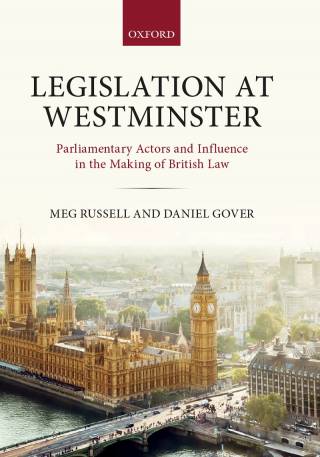Russell and Gover's Legislation at Westminster is the principal output of a major Constitution Unit project funded by the Nuffield Foundation, which explored parliament's influence in the legislative process through close study of 12 government bills passing through both chambers. Based on study of the over 4,000 amendments proposed to the bills, and more than 100 interviews with key protagonists, the book explores the dynamics of the legislative process and the various sets of parliamentary actors that contribute. It offers an overview of the legislative process, and of parliament's influence within that process, as well as a set of chapters focusing on the specific contributions of different actors: the government, opposition, government backbenchers, non-party parliamentarians, select committees, pressure groups, and groups of parliamentarians working together on a cross-party basis.
The book draws important conclusions about the dynamics of how legislation is agreed at Westminster, the contribution of both chambers of parliament to British policy-making, and more generically the way in which legislatures work in parliamentary systems. Full of real-world examples and lively quotations from protagonists, as well as robust quantitative analysis of the fate of amendments, the book will be of interest to both academic audiences with an interest in British politics, the British parliament or comparative legislative studies, and audiences outside academia who simply want to understand how legislation is made, how parliament really works, or how they themselves can influence the process.
Readers with library access can find the ebook here via Oxford Scholarship Online.
Buy from publisher with discount
Enter the discount code ALAUTHC4 at the checkout to receive 30% off when you order with OUP.
Watch the seminar
An event was held in parliament in November 2017 at which the authors discussed their findings, with responses from Labour's Baroness Hollis and Clerk of the House of Commons David Natzler. For more details, click here.
What people say about the book:
" This remarkable book is a must-read for anyone wanting to know how laws are put together or how parliament really works. Especially those of us who thought we knew already." Ed Page, Professor of Public Policy, LSE. Read the full review
" A very important book. It needs to be read by all who think that parliament doesn't work & the law should fill the gap." Sir Stephen Laws, Former First Parliamentary Counsel. From tweet on 3 September 2017
" Lots of people have views about how Westminster works – or doesn't. But few bother to put in the necessary work to research the place properly. Two outstanding exceptions to that rule are Meg Russell and Daniel Gover. This book is a model example of how to study parliament." Philip Cowley, Professor of Politics, Queen Mary University of London
" Russell and Gover provide a nuanced and comprehensive examination of the influence of Westminster on policy-making in the UK, challenging the common interpretation of the UK parliament as 'rubber stamp' or 'talking shop'. Though focused on the UK case, Legislation at Westminster provides useful insights into the myriad tools that parliaments can deploy in their efforts to shape legislation, making it a valuable resource for all interested in legislatures, executive-legislative relations and the policy process more generally." Amie Kreppel, Jean Monnet Chair, Department of Political Science, University of Florida
" If you want to know the true story of how parliament legislates, read this book carefully. If you think you already know, then read it even more carefully - as this is about real bills and the politics behind and within each of them, and it may well contain things that surprise you. If instead you're interested in politics but not in legislation at Westminster, then you're missing something: there is more going on than meets the eye!" David Natzler, Clerk of the House of Commons
" I would like to congratulate Meg and Daniel. I think the book is admirable, I think it's elegant and important, and as a former historian by trade, I am amazed at the long, careful, fastidious attention to detail that Meg and Daniel engaged in. It made my head spin, so well done to you." Baroness (Patricia) Hollis of Heigham, Labour member of the House of Lords
" The book obviously offers insights beyond the 'parliamentary state' (David Judge) nature of the UK. The fact that the parliamentary stage of policy-making turns the light of publicity on the government, as well as the anticipatory effects of the formal parliamentary rights (from approving Bills to censuring the government) on government, tell us something about the neglected role of legislatures within parliamentary democracies. Similarly, the ways in which opposition actors or disadvantaged (Lords) actors seek influence by exploiting divisions within the governing party and by utilizing the iterative nature of parliamentary procedures offers us important insights for the study of legislatures that go way beyond Westminster." Olivier Rozenberg, Sciences Po. Read the review on Wiley Online Library website.
" In Legislation at Westminster, an important new academic study looking at exactly what influence parliamentarians and other players exercise when legislation is getting passed, Meg Russell and Daniel Gover write at length about the power of "anticipated reactions" - in other words, how the executive is constrained in what it tries to get through parliament by what it knows MPs and peers will and will not expect. The same principle applies in Brussels, where the parliament's "anticipated reaction" power is significant. A revealing book - academic, but readable. Andrew Sparrow, Political Correspondent for The Guardian. Taken from live commentary on 07 March 2018 and on 18 April 2018.
"[T]he authors offer critical insights into the Westminster legislative process and a new methodology for analysing parliamentary influence. Both of these should be of particular value to public lawyers. For too long critics and defenders of the UK's constitutional arrangements have based their claims on untested assumptions about Parliament's influence over the law-making process." Robert Greally, University of Sheffield, The Cambridge Law Journal
 Close
Close


